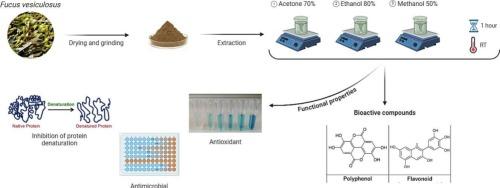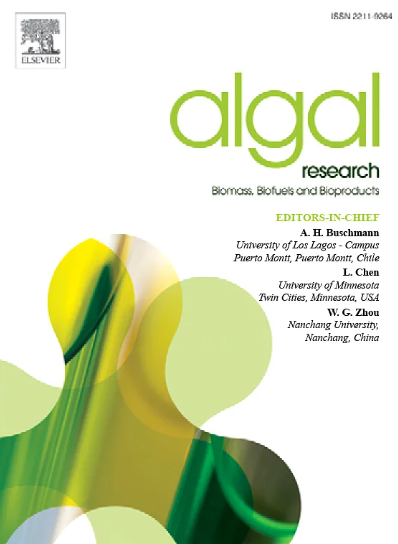用不同传统溶剂提取的岩藻提取物功能特性的体外评估
IF 4.6
2区 生物学
Q1 BIOTECHNOLOGY & APPLIED MICROBIOLOGY
Algal Research-Biomass Biofuels and Bioproducts
Pub Date : 2024-11-02
DOI:10.1016/j.algal.2024.103787
引用次数: 0
摘要
岩藻含有丰富的生物活性物质,具有多种生化功能,可产生多种生物效应。多年来,人们通过应用不同的方法提取生物活性化合物,并将其用于各种用途,取得了巨大的研究成果。用于提取天然产品的溶剂有多种,因为溶剂的选择必须主要基于基质的特征和要获得的分子类别的特性。因此,本研究的目的是调查不同传统溶剂的效率,以最大限度地提高多酚和类黄酮的产量以及抗氧化、抗菌和抗炎能力。研究分析了不同提取物的多酚总含量(TPC)和类黄酮总含量(TFC)。此外,还评估了抗氧化、抗菌和抗炎能力。有关生物活性分子含量的结果显示,与丙酮和乙醇提取物相比,甲醇提取物(50%)的多酚(2.27 ± 0.17 毫克 GAE/50毫克样品)和黄酮类化合物含量(187.12 ± 12.86 毫克 CE/50毫克样品)的产量最高。在功能特性方面,研究结果表明 F. vesiculosus 的提取物具有很高的抗氧化能力(90% 的自由基清除活性抑制率)。此外,生长抑制试验表明,F. vesiculosus 能显著减少大肠杆菌 F18+ 的生长(p < 0.05),特别是用甲醇和丙酮提取藻类时。此外,浓度为 1 毫克/毫升的 F. vesiculosus 可抑制 60% 的蛋白质变性,突出了其潜在的抗炎活性。总之,这项研究揭示了马齿苋中丰富的生物活性分子和由此产生的功能特性,同时也突出了甲醇作为提取溶剂的威力。本文章由计算机程序翻译,如有差异,请以英文原文为准。

In vitro evaluation of functional properties of extracts of Fucus vesiculosus obtained with different conventional solvents
Fucus vesiculosus is a rich source of bioactive substances with many biochemical functions that provide it a variety of biological effects. Over the years, significant research efforts have been made to extract bioactive compounds by applying different methodologies for various applications. There are several solvents used for the extraction of natural products since the choice of solvent must be based primarily on the characteristics of the matrices and the properties of the molecular classes to be obtained. Therefore, the aim of this study was to investigate the efficiency of different conventional solvents to maximize the yield of polyphenol and flavonoid content as well as the antioxidant, antimicrobial and anti-inflammatory capacity. The different extracts of F. vesiculosus were analyzed for the Total Polyphenol Content (TPC) and the Total Flavonoid Content (TFC). As well the antioxidant, antimicrobial, and anti-inflammatory capacities were evaluated. The results concerning the content of bioactive molecules disclosed that the extraction carried out with the methanol (50 %) was the one that gave the highest yield in both polyphenol (2.27 ± 0.17 mg GAE/ 50 mg of sample) and flavonoid content (187.12 ± 12.86 mg CE/50 mg of sample) compared to acetone and ethanol extracts. Regarding the functional properties, the results obtained disclose that the extract of F. vesiculosus had a high antioxidant capacity (90 % inhibition of radical scavenging activity). Additionally, the growth inhibition assay disclosed that F. vesiculosus can reduce significantly (p < 0.05) the growth of E. coli F18+, in particular when the alga is extracted with methanol and acetone. As well, a concentration of 1 mg/mL of F. vesiculosus inhibits the protein denaturation by 60 %, highlighting a potential anti-inflammatory activity. In conclusion, this study discloses the richness of bioactive molecules in F. vesiculosus and the resulting functional properties, highlighting also the power of methanol as extraction solvent.
求助全文
通过发布文献求助,成功后即可免费获取论文全文。
去求助
来源期刊

Algal Research-Biomass Biofuels and Bioproducts
BIOTECHNOLOGY & APPLIED MICROBIOLOGY-
CiteScore
9.40
自引率
7.80%
发文量
332
期刊介绍:
Algal Research is an international phycology journal covering all areas of emerging technologies in algae biology, biomass production, cultivation, harvesting, extraction, bioproducts, biorefinery, engineering, and econometrics. Algae is defined to include cyanobacteria, microalgae, and protists and symbionts of interest in biotechnology. The journal publishes original research and reviews for the following scope: algal biology, including but not exclusive to: phylogeny, biodiversity, molecular traits, metabolic regulation, and genetic engineering, algal cultivation, e.g. phototrophic systems, heterotrophic systems, and mixotrophic systems, algal harvesting and extraction systems, biotechnology to convert algal biomass and components into biofuels and bioproducts, e.g., nutraceuticals, pharmaceuticals, animal feed, plastics, etc. algal products and their economic assessment
 求助内容:
求助内容: 应助结果提醒方式:
应助结果提醒方式:


